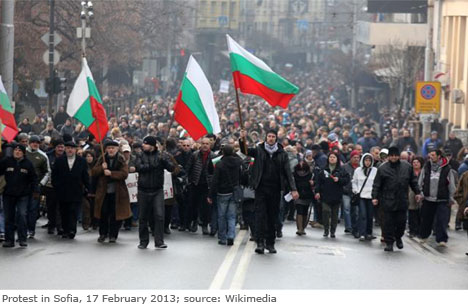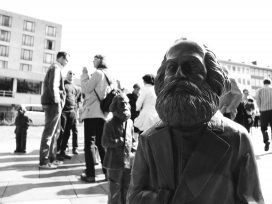Bulgaria appears to be another casualty of the pan-European austerity wave. In mid-February 2013, a steep increase in electricity bills provoked tens of thousands of people to take to the streets in Sofia and other cities. They expressed special anger at the country’s power-distribution companies,[1] all of which are owned by foreign investors. The protests[2] escalated into a full-blown crisis that, within days, forced the government of prime minister Boyko Borisov first to sack his finance minister Simeon Djankov and then to announce his own resignation.
 The crisis has been depicted in the western media as a response to the hardships of austerity, a narrative which – in a notable convergence – officials in the outgoing government then embraced (while confessing that the belt-tightening had gone too far, and that this was their chief mistake). The government, after all, had prided itself on an exemplary fiscal record,[3] with public debt at 15 per cent of GDP (the second lowest in the European Union), the budget deficit at below 3 per cent of GDP), and unemployment at 12 per cent (which, though serious, is not as dire compared to elsewhere in southern Europe). All this, of course, was pursued in the interest of long-term fiscal stability, in conformity with the EU’s rulebook, and with the currency board’s rule that ties the Lev to the euro.
The crisis has been depicted in the western media as a response to the hardships of austerity, a narrative which – in a notable convergence – officials in the outgoing government then embraced (while confessing that the belt-tightening had gone too far, and that this was their chief mistake). The government, after all, had prided itself on an exemplary fiscal record,[3] with public debt at 15 per cent of GDP (the second lowest in the European Union), the budget deficit at below 3 per cent of GDP), and unemployment at 12 per cent (which, though serious, is not as dire compared to elsewhere in southern Europe). All this, of course, was pursued in the interest of long-term fiscal stability, in conformity with the EU’s rulebook, and with the currency board’s rule that ties the Lev to the euro.
At the same time, Bulgaria remains the poorest (or second poorest, depending on the measure used) country within the EU; the average salary (380 euros) and pension (140 euros) make Bulgarians envy even their hardship-stricken Greek neighbours; and utility bills, though in the case of electricity actually lower than in most EU countries, take a disproportionally high share of households’ expenses, particularly in winter months.
Overall, the government’s record – with Djankov the chief proponent of budgetary discipline – allows the conclusion that what ruined Borisov’s cabinet was a well-intentioned yet unbalanced mix of economic policies. This assigns Bulgaria to the familiar pattern of austerity-crisis which has already gripped Greece, Italy and Spain.[4] Unsurprisingly, a few members of the former cabinet have spread the line in many media outlets that financial severity (rather than poor governance) prompted the protests.
The context
There is, though, a problem with this interpretation. For one thing, austerity in Bulgaria is nothing new: unlike Greeks or Spaniards, Bulgarians have in recent decades endured several cycles of economic crisis followed by painful adjustment measures. For another, Germany is not the villain for the protesters, nor is Brussels-bashing de rigueur. Bulgarians opened their economy without complaint in order to make it into the EU in 2007,[5] accepted lower agricultural subsidies, and tolerated transitional measures limiting their right to work in other member-states – even as xenophobic rhetoric from some western leaders and media painted them as parasites ready to milk the British or other welfare systems.
Through all this, there has been no backlash. Europe continues to win plaudits, especially if it face-slaps Bulgaria’s own politicians. The protesters have no grudge against Angela Merkel, the European commission or the IMF (whose treatment Bulgaria’s government, unlike its counterparts in Serbia and Romania, managed to avoid).
This background indicates that Bulgaria’s crisis involves more than economics.[6] In fact, it is animated not by anti-austerity but by anti-politics. An indication of this is that the protesters are unimpressed by the Keynesian rhetoric of the opposition Bulgarian Socialist Party (BSP), even as they call for the state to intervene in the economy and action against poverty. Moreover, Borisov’s downfall was followed by populist calls for a radical overhaul of the “system”; among the measures proposed were citizen control over the energy sector, kicking out “monopolies” (especially those in foreign hands), civic quotas in regulatory bodies, a new constitution and electoral code, and even banning political parties and jailing all national leaders in power since the 1990s.
This, then, is not a battle for the budget but a revolt against the political elite – right, left and centre. The public rallies are raising issues such as corruption and state-capture, and questioning the Bulgarian post-communist transition in its entirety: the political class and the economic model it oversaw.
In truth, we have been here before.[7] Bulgarian voters have often favoured “anti-systemic” actors pledging to uproot corruption and crack cronyism to empower transition’s underdogs. This national pattern started with ex-king Simeon II’s landslide victory in the June 2001 election.[8] His image as an outsider untainted by the sleaze of party politics enabled him to destroy the post-1989 bipolar model built by the ex-communist BSP and the pro-western centre-right.[9]
In 2005 the xenophobic populist movement Ataka emerged,[10] with its leader Volen Siderov reaching the second round of the 2006 presidential elections. No one, however, was more skilled in capturing the anti-establishment mood than Boyko Borisov, who had served as a tough-talking head of police under King Simeon’s government.[11] By mid-2009, he had become prime minister, promising to clamp down on high-level corruption, oligarchs and organized crime and to bring Bulgaria into the EU mainstream. Another four years on, protesters see his party – Citizens of European Development of Bulgaria (GERB) – as the epitome of cronyism[12] and mismanagement, yet believe that the opposition is no better.
This time around, there is no knight in shiny armour to rescue Bulgaria from herself.
The difference
The implication of this analysis is that it would be premature to label the current crisis a transformative moment. The appointment of a caretaker government under Marin Raikov on 12 March – with parliamentary elections scheduled for 12 May – shows that the political status quo is far from shaken. Bulgaria is not getting its Beppe Grillo or Alexis Tsipras. There is simply not enough time for new actors and forces to forge the protesters’ demands, incoherent as they might be, into a political programme. If, as is possible, the election ushers into parliament some painfully familiar faces, public frustration will rise; what better proof will there be that the system is thoroughly rotten than if GERB’s rule is succeeded by a BSP-led coalition, as in 2005-09? And even if a new government defuses anger by hiking salaries and pensions, distrust in political institutions and elites is so rooted that the protests could well return before next winter.
Yet there are some signs that the latest situation may avoid being just “more of the same”. In Varna, Bulgaria’s main Black Sea port, 50,000-strong protests forced the resignation of the long-serving mayor Kiril Yordanov, who was tainted by his association with crony networks. The self-immolation of Plamen Goranov, a 36-year old who burned himself in front of the municipality building, spurred a nationwide emotional reaction; many even compared[13] his sacrifice to that of the Czech pro-democracy martyr Jan Palach[14] four months after the Red Army invasion of Czechoslovakia in September 1968.
Goranov’s suicide empowered local citizens to raise their voice against TIM, a business conglomerate allied to Borosov that is said to control up to two-thirds of Varna’s economy. Pressure is mounting on the municipal council, largely controlled by TIM,[15] to dissolve. The genie is out of the bottle.
In an ideal world, Bulgaria’s spring of anger would make government institutions more accountable, break the endemic cynicism that paralyses public life, and allow politics to recover at least a modicum of its emancipatory potential. But the outburst might equally destroy what little legitimacy a dysfunctional democratic regime enjoys with the citizenry. If that happens, Bulgaria will truly make a special contribution to the gloom that is settling upon Europe.
References:
[1] See: http://www.reuters.com/article/2013/02/17/us-bulgaria-protests-electricity-idUSBRE91G0C520130217
[2] See: http://www.bbc.co.uk/news/world-europe-21592373
[3] See: http://www.minfin.bg/en/page/542
[4] See: http://www.voxeu.org/article/panic-driven-austerity-eurozone-and-its-implications
[5] See: http://www.opendemocracy.net/article/europe-s-other-legitimacy-crisis
[6] See: http://www.bbc.co.uk/news/world-europe-21766699
[7] See: http://www.freedomhouse.org/report/freedom-world/2012/bulgaria
[8] See: http://www.ipu.org/parline-e/reports/arc/2045_01.htm
[9] See: http://europe.cnn.com/2001/WORLD/europe/07/24/bulgaria.parliament/index.html
[10] See: http://www.opendemocracy.net/daniel-smilov/bulgaria%E2%80%99s-tense-week-spark-fire-and-solvent
[11] See: http://www.citymayors.com/mayors/sofia-mayor.html
[12] See: See: http://www.opendemocracy.net/democracy-europefuture/bulgaria_3194.jsp
[13] See: http://www.novinite.com/view_news.php?id=148124.jsp
[14] See: http://www.radio.cz/en/section/czechs/jan-palach-the-student-whose-self-immolation-still-haunts-czechs-today
[15] See: http://www.novinite.com/view_news.php?id=148556

 The crisis has been depicted in the western media as a response to the hardships of austerity, a narrative which – in a notable convergence – officials in the outgoing government then embraced (while confessing that the belt-tightening had gone too far, and that this was their chief mistake). The government, after all, had prided itself on an exemplary fiscal record,[3] with public debt at 15 per cent of GDP (the second lowest in the European Union), the budget deficit at below 3 per cent of GDP), and unemployment at 12 per cent (which, though serious, is not as dire compared to elsewhere in southern Europe). All this, of course, was pursued in the interest of long-term fiscal stability, in conformity with the EU’s rulebook, and with the currency board’s rule that ties the Lev to the euro.
The crisis has been depicted in the western media as a response to the hardships of austerity, a narrative which – in a notable convergence – officials in the outgoing government then embraced (while confessing that the belt-tightening had gone too far, and that this was their chief mistake). The government, after all, had prided itself on an exemplary fiscal record,[3] with public debt at 15 per cent of GDP (the second lowest in the European Union), the budget deficit at below 3 per cent of GDP), and unemployment at 12 per cent (which, though serious, is not as dire compared to elsewhere in southern Europe). All this, of course, was pursued in the interest of long-term fiscal stability, in conformity with the EU’s rulebook, and with the currency board’s rule that ties the Lev to the euro.




